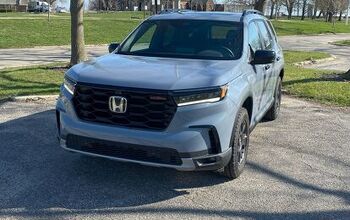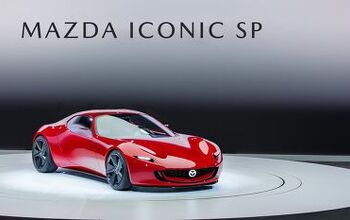Opinion: EV Owners Don't Need a Home Charger

Filling up your car’s fuel tank is a normal and familiar chore for almost every car owner, right? You’re all familiar with the idea of driving a few hundred miles – whether that’s all at once on a road trip or in starts and stops around town – then pulling up to your local fuel spot and buying more fuel. You don’t have a fuel pump at home that you use to top off your car every night, and that’s perfectly normal. You don’t seek out apartments based on whether or not they have a gas station on-site, and that’s perfectly normal, too. Why, then, are EV evangelists so Hell-bent on charging at home?
It’s a bizarre way to think about home fueling, maybe – but outlets like US News and World Report are actively running headlines like, “ Can You Own an Electric Car if You Can’t Charge at Home?” these days, so the question is definitely out there. And, as they say: “Don’t ask the question if you don’t want to know the answer,” right?
Right.
So, can you own an electric car if you can’t charge at home? The answer is: Sure. The better answer is, though, is: absolutely – and you may want to ask yourself why you ever wanted a home charger in the first place.
Sure, you can own an electric car even if you don’t charge at home. Depending on where you live, though, it may not be practical. In my old South Miami neighborhood, it seems perfectly doable, with publicly accessible chargers that will work with our new Mustang Mach-E GT just about everywhere.
That level 6 charger in Dadeland Mall? That would have been more convenient for me to get to than the nearest actual gas station was when I lived there – and the 40 minutes I’d need to spend there in dwell time? It’s certainly not the same as five minutes at the pump, but it’s doable. And, frankly, I piss away at least 40 minutes of my life at Target every week as it is, so someone like me loses nothing in terms of time spent refueling.
What’s more, it’s a rare week that I drive 200 miles at all these days. I think that’s probably true for many people who live in urban areas or more built-up suburbs, too – so it seems like it would be an easy enough ask for me to plug in at the Target or Whole Foods or Trader Joe’s or anywhere else I’ll have 30 min. to an hour of dwell-time. And that’s the key thing: dwell time.
If you drive somewhere regularly between fill-ups now, with your gas-powered car, you’ll probably still drive there regularly with an EV. And if they have newer fast-chargers? You’re done.
Note: there’s no point in trying to make this kind of case for places like San Angelo, TX. The infrastructure may be coming, but it’s not there yet ( even for gas, at times). There are implied asterisks and disclaimers all over this article, and I get that – but they’re not putting gas pumps in their garages, either.
Besides that, charging at home is cheap – but it’s not free. Getting a Chargepoint spec charger installed isn’t free, either, with JD Power claiming that “ Costs can easily run $1,000 to $2,000.” When you can Cannonball a Mustang Mach-E from San Diego, CA to Jacksonville, FL (just over 2,400 miles) on just $160 of electricity … well, that $2,000 would pay for a lot of miles.
And, by the time you’ve put said miles on your EV, that public charging network is going to be that much better, and that much more universally accessible, too. The new EVs will probably charge that much faster, too, making these low-tech home chargers seem almost like a weird, intermediate step in technology. Sort of like Palm Pilots in the days before smartphones really kicked in and out-Darwined everything to the point that we just call them “phones” now, you know?
So, I dunno. If you’re shopping for an EV in a highly developed suburb or urban neighborhood, I’m sure you’re going to be fine, home charger or not.
[Images: Roschetzky Photography/Shutterstock.com, screenshots from the author]

I've been in and around the auto industry since 1997, and have written for a number of well-known outlets like Cleantechnica, the Truth About Cars, Popular Mechanics, and more. You can also find me talking EVs with Matt Teske and Chris DeMorro on the Electrify Expo Podcast, writing about Swedish cars on my Volvo fan site, or chasing my kids around Oak Park.
More by Jo Borras
Latest Car Reviews
Read moreLatest Product Reviews
Read moreRecent Comments
- Doug brockman There will be many many people living in apartments without dedicated charging facilities in future who will need personal vehicles to get to work and school and for whom mass transit will be an annoying inconvenience
- Jeff Self driving cars are not ready for prime time.
- Lichtronamo Watch as the non-us based automakers shift more production to Mexico in the future.
- 28-Cars-Later " Electrek recently dug around in Tesla’s online parts catalog and found that the windshield costs a whopping $1,900 to replace.To be fair, that’s around what a Mercedes S-Class or Rivian windshield costs, but the Tesla’s glass is unique because of its shape. It’s also worth noting that most insurance plans have glass replacement options that can make the repair a low- or zero-cost issue. "Now I understand why my insurance is so high despite no claims for years and about 7,500 annual miles between three cars.
- AMcA My theory is that that when the Big 3 gave away the store to the UAW in the last contract, there was a side deal in which the UAW promised to go after the non-organized transplant plants. Even the UAW understands that if the wage differential gets too high it's gonna kill the golden goose.





































Comments
Join the conversation
All this talk of "Home Chargers" ignores the reality that any such device in a home is really a "charging point", NOT a charger. A battery requires DC to charge it, but the home devices put out either 120 or 240VAC. It is the vehicle's electronics that convert this AC into DC so in effect the vehicle has a built in charger. The charging point in the home primarily provides a safe connection with ground fault interrupting breaker and handshaking with the vehicle to ensure that power is applied in a safe manner. A "Fast DC Charger" is a true charger but it is extremely unlikely to find one of these in a home. They generally require 3 phase 480VAC input so this would be a HUGE upgrade for almost any residence. A good tutorial on this can be found at: https://www.youtube.com/watch?v=RMxB7zA-e4Y
I have a PHEV Hybrid Home charger is a must.